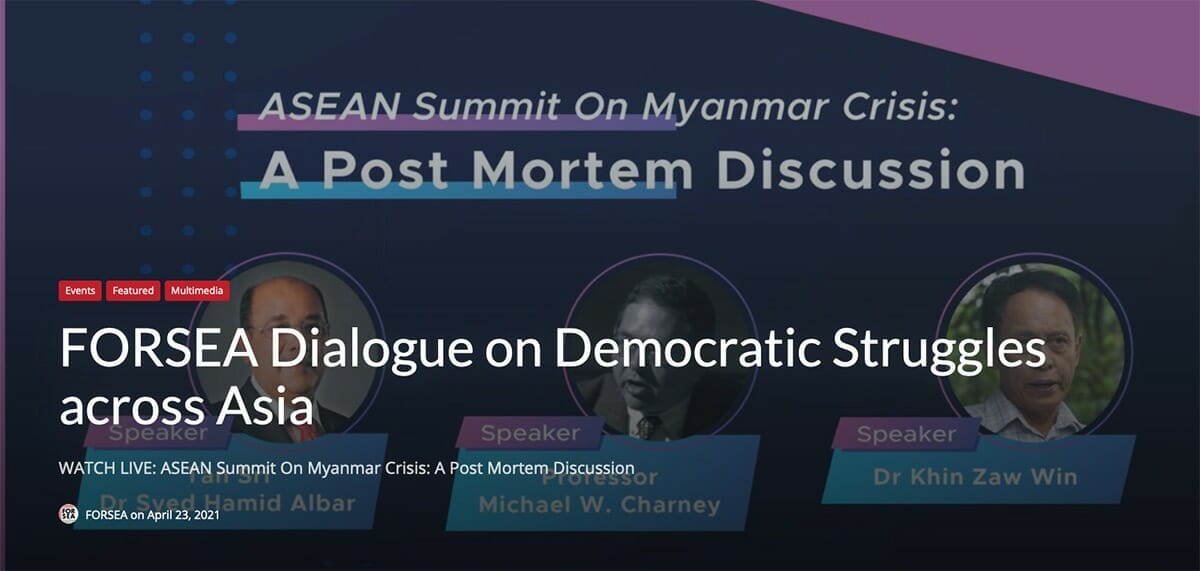Amidst vociferous criticism and protestations against the invitation of Min Aung Hlaing, the leader of the coup regime, to the special Summit on Myanmar, the Association of South East Asian Nations (ASEAN) is going ahead with its ASEAN Summit on Myanmar in Jakarta, to be hosted by Indonesian President Jokowi with the support of and under the chair-ship of Brunei.
The fact that the regional bloc has organized the summit specifically devoted to the single issue of Myanmar’s deepening political crisis indicates that ASEAN is making an unprecedented break from its half-century of “Non-Interference” in the internal affairs of member states.
Min Aung Hlaing is the commander-in-chief of Myanmar Armed Forces which perpetrated the genocidal purge of the Rohingyas in 2017, war crimes and crimes against humanity in other minority regions such as Kachin, Shan, Karen, and so on. Since the coup in February 2021, the troops have been seen on social media platforms terrorising unarmed peaceful protesters, having murdered more than 700 people including around 4-dozen children and abducted over 3,000 anti-coup activists.
It is understandable why human rights activists across the region are outraged by what they consider an act of legitimization of the murderous regime by ASEAN.
While FORSEA shares this regional moral outrage, FORSEA is equally deeply disturbed by the intellectual poverty in the bloc’s one-sided, one-dimensional and state-centred attempt to engage only with the murderous regime.
It is a grave mistake for ASEAN to be choosing not to recognize and engage with Myanmar’s Interim National Unity Government which represents broad-based constituencies, from the popularly elected MPs from the re-elected National League for Democracy party of Ms Aung San Suu Kyi to new representatives from Myanmar civil society and communities of national minorities.
Additionally, it is questionable for the coup regime under Min Aung Hlaing to be considered and treated as a “state actor”: it has been left with a largely non-functioning state – thanks to the the Civil Disobedience Movement of hundreds of thousands of Myanmar civil servants, from doctors and nurses, transport workers to university academics, and grade schoolteachers, and administrative workers across state sectors. Importantly, the multi-ethnic and multi-faith society at large in Myanmar now views the coup regime – and the rank and files of the national armed forces or Tatmadaw – as terroristic occupying alien troops. Accordingly, virtually all segments of the Myanmar public today ostracize anything Myanmar military, from consumer products and military-owned business to military families.
Against this backdrop of a Zero-sum all-out civil-military conflict, inviting and engaging with only one party in conflict, that is, perpetrating national military representatives, but not the other – representatives of the victimized public makes absolutely no sense at all, even from a conflict-resolution perspective.
FORSEA agrees with Ms Zin Mar Aung, Foreign Minister for the Interim NUG, when she told the South China Morning Post, “We cannot have the largest interstate organisation, the UN, recognising the anti-coup ambassador speaking for the Burmese public… and [ASEAN], a small 10-member interstate organisation, recognising in effect the coup leader.” It’s time for ASEAN to engage all parties in Myanmar’s worsening conflict.
FORSEA


